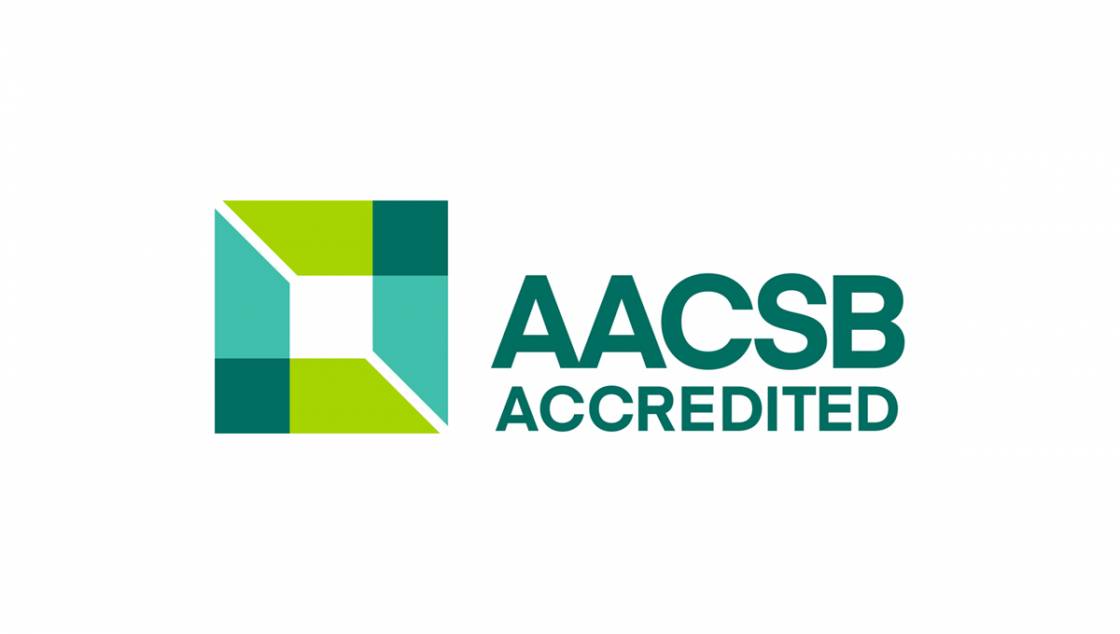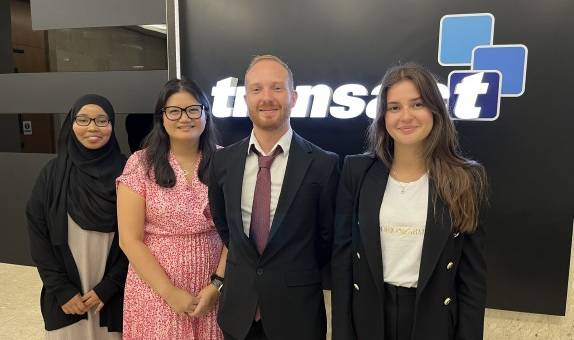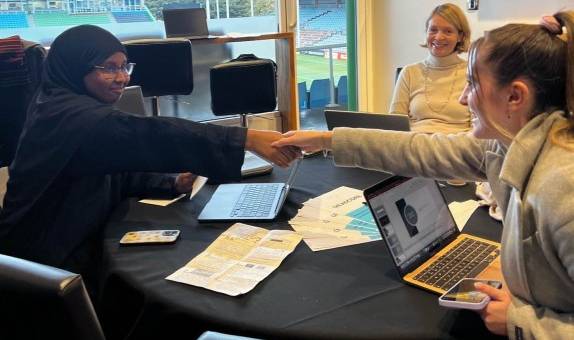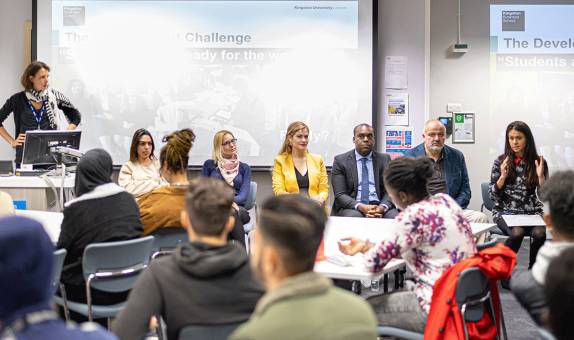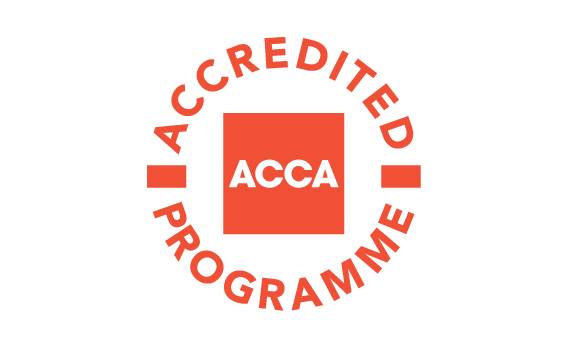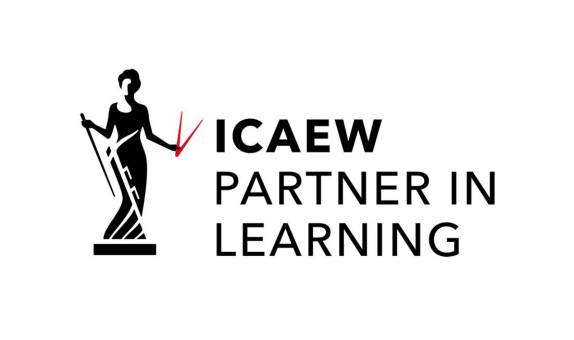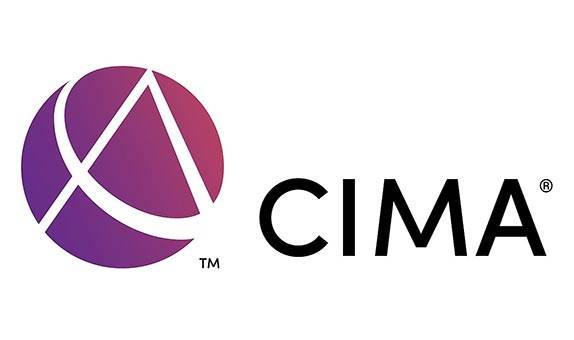Accounting and Finance BSc (Hons)

Teaching Excellence Framework (TEF) Gold award
Our commitment to high quality teaching has been recognised with a TEF Gold rating. The University has received an overall rating of Gold, as well as securing a Gold award in the framework's two new student experience and student outcomes categories.
Why choose this course?
This course offers hands-on experience and in-depth knowledge of financial accounting, management accounting and finance. It will help you develop the intellectual skills necessary to evaluate and critique both theoretical and practical aspects of accounting and finance. Your studies will reflect the digital transformation in the industry.
Our teaching team has a wealth of commercial experience and you will enhance your career prospects by joining industry speakers and employer networking events. Our careers team are on hand to help you land your dream internship and graduate job.
You will also have the opportunity to gain Bloomberg Certification and take part in activities to boost your CV.
The course is accredited by the Association of Chartered Certified Accountants (ACCA), the Chartered Institute of Management Accountants (CIMA) and the Institute of Chartered Accountants in England and Wales (ICAEW). It offers partial exemptions from their professional exams. Kingston University is also an ICAEW Higher Education Partner in Learning.
Please note the change in course title: This course previously ran as ‘Accounting and Finance with Business Experience BSc (Hons)' until 2021. For 2022 entry onwards, it is named ‘Accounting and Finance BSc (Hons)'.
| Attendance | UCAS code | Year of entry |
|---|---|---|
| 3 years full time | N420 | 2024 (Clearing) 2025 |
| 4 years full time including sandwich year | N422 | 2024 (Clearing) 2025 |
| 4 years full time including foundation year | N421 | 2024 (Clearing) 2025 |
Please note: Teaching on this course may take place on more than one KU campus.
| Main Location | Kingston Hill |
Reasons to choose Kingston University
- You'll have access to a network of highly regarded practitioners from prestigious institutions and participate in bespoke business visits.
- Access to Bloomberg terminals provides you with vast data and the latest technological and analytical tools, enabling you to analyse and make sense of financial and economic data effectively.
- You will also be able to obtain certifications through Bloomberg Education.
- The course is accredited by the Association of Chartered Certified Accountants (ACCA), the Chartered Institute of Management Accountants (CIMA) and the Institute of Chartered Accountants in England and Wales (ICAEW) and offers partial exemptions from their professional exams.
- 97.9% of students thought staff were good at explaining things and supported their learning (NSS 2023).
About the Department of Accounting, Finance and Informatics
The Department of Accounting, Finance and Informatics delivers high quality degrees in accounting, banking, finance, investment, financial technology, risk management and real estate. Our courses are accredited by professional bodies including ACCA, CIMA, ACT, RICS and ICAEW.
We are located on the doorstep of London - one of the world's largest financial hubs - where our partnerships with global organisations give you access to meaningful opportunities. We are one of only a few UK universities to have a Bloomberg Trading Room.
At Kingston Business School we lead
What you will study
Take a look at some of the content and modules that you may have the opportunity to study on this course:
Year 1
Year 2
Final year
In Year 1 you will cover the business and legal environments in which accounting and finance operate. You'll study economics, organisational behaviour, law, quantitative analysis and develop your IT skills. You'll also be introduced to the basics of financial accounting and bookkeeping and you'll start your further study on Financial Reporting and Management Accounting. You will also begin the business readiness programme in preparation for your Business Practice in Year 2.
Core modules
Management Accounting
30 credits
This module will introduce you to management accounting and develop your knowledge and understanding of management accounting techniques to support management in planning, controlling and monitoring performance in a variety of business contexts.
Financial Accounting
30 credits
This module is designed to provide students with an introduction to financial accounting. The purpose and importance of financial accounting will be explained and students will learn how to produce financial statements from the original source documents through the recording of transactions to the final production of a profit and loss account and balance sheet for a non-complex business. The module will also explain the subjective nature of financial accounting with its need for professional judgement, and students will be introduced to the concepts and principles that underlie financial accounting and reporting. Students will also gain practical experience of inputting data into Sage and/or Xero accounting software and using spreadsheets to prepare financial information.
Business Information Analysis
30 credits
This module is an introduction to the mutually-dependent business topics of mathematics and information technology. It provides motivation for the use of these topics in business problem solving. It also emphasises their need for one another: one would not use mathematics to solve a business problem without the aid of information technology; equally importantly one cannot effectively use information technology without mathematics.
The module is delivered using a problem-centric approach. Students will be required to design and create models using information technology to solve business-related problems.
The Accountant's Business Environment
30 credits
This module will introduce you to theories and practices of business organisations. The internal structures and relations of businesses are covered, along with their interactions with the external economic, legal, social and technological environments. Explanations are offered of how the organisation of businesses is shaped by the behaviour of individuals, groups and organisations, and by the external influences of markets, industries and the macroeconomic environment. Special attention is given to considerations of businesses ethics and values. In the module you will engage in activities that enable you to develop your academic skills and other relevant skills, which can be applied throughout your time at university and taken into your future work and organisations.
In Year 2 there is a focus on the three main areas of accounting and finance: financial accounting, management accounting and finance. You can also study Auditing or Enterprise Finance and Management. In addition you will complete stage 2 of the business readiness programme. You will carry out your Business Practice in Year 2 from May, for a minimum of three months.
Core modules
Financial Reporting
30 credits
This module focuses on the financial reporting requirements of companies and builds on concepts already studied in the first-year Financial Accounting module. In this module students will consider the concepts and principles that govern the practices of financial accounting, and examine their application through a variety of financial reporting standards across a number of different accounting areas, from non-current assets to contingent liabilities, from inventories to pensions.
Advanced Management Accounting
30 credits
This module builds on the second-year module BA5803 Management Accounting and is designed to give undergraduate accounting students an advanced course exploring the provision and use of accounting information in management decision-making. Students will be involved in an active learning approach and will be expected to reflect on the purpose and uses of management accounting information, evaluate case study scenarios, discuss theoretical accounting concepts and utilise a range of practical techniques to solve advanced management accounting related issues.
Finance
30 credits
In this module you will be introduced to the process that corporations undertake to acquire money and allocate it to optimise investment decisions and maximise shareholders' wealth. The module delves into the realm of managing the cost of financing and forecasting future cash flows and returns of different projects.
It takes a thorough approach when looking into the various risks which affect corporations, and it will help you analyse and reflect on the interrelationship between interest rates, inflation and taxes and their effect on the viability of different finance sources and investments.
You will learn about the relationship between risk and return, investment strategies, different asset classes and their associated benchmarking and valuation methods.
Optional modules (choose one 30-credit module and two 15-credit modules)
Auditing
30 credits
Students studying this module will develop an understanding of the operational, practical and theoretical issues in auditing. Students will develop an awareness of the audit process, its limitations and the influence of regulation on audits. In order to balance theory with practice, the module will cover relevant international standards on auditing and relevant statutes such as the Companies Acts, Fraud Act, Money Laundering Act and Bribery Act. Case law, in so far as it affects auditing practices, will also be discussed. Ethics, corporate governance, environmental and social issues, fair values and information technology will also form part of the course curriculum.
Financial Investments
15 credits
This module is designed to provide students with a broad understanding of the field of investment. The main topics covered include: the UK stock market, stock valuation, investment strategies for equities, financial derivatives, portfolio diversification, optimal portfolio construction and financial risk management. Students will use the dedicated Bloomberg dealing room and software packages to access real-time financial data. Teaching consists of traditional lectures, and also lab sessions where hands-on practical exercises are provided. The module is assessed via the Bloomberg Market Concept (BMC) certificate and two coursework where students are required to construct and manage financial solutions for a specific period.
Law for Accountants
30 credits
This module is designed to provide students with a general understanding of the English legal system and a more advanced understanding of the principal areas of law that may be encountered in business or professional practice and which are of concern to accounting and finance professionals, focussing on civil and criminal consequences for professionals. Furthermore, it is designed to provide students with an understanding of the formation and constitution of business organisations, company law and insolvency law.
The module commences with a focus on sources of law and the court system in England and Wales, before considering the areas of contract, agency and tort law, which underline business transactions. This module will then examine the criminal laws relevant to accountants or business in practice, including fraud, bribery and anti-money laundering. It then provides an overview of the formation and constitution of business organisations, including partnerships and companies, before considering various aspects of company law such as the formation, administration and the regulation of companies.
The module will look at the role of shareholders and directors and the financing of companies, Insolvency law will also be considered, looking at the different insolvency proceedings, such as liquidation and administration and considering the implications of insolvency.
Money, Banking and Financial Markets
15 credits
This module is for those students who want to develop their knowledge of finance into the areas of banking and financial markets. The module is concerned with the principles of management and strategic management and their applications to the financial services sector, including the banking, insurance, and securities sectors and financial markets and systems, all of which are essential to the functioning of modern economies. Although the module is about financial systems in general, there will be frequent reference to contemporary issues and problems, and to their historical antecedents. The approach will incorporate a blend of published economic and financial data, and as far as possible, international comparisons.
Data Analytics for Business
15 credits
The aim of this module is to give students a foundation in the uses of data analytics for business. It aims at a critical understanding of issues regarding the collection of data and the correct application of statistical techniques in a business context. The module introduces students to analytical tools and including inferential data analysis to support business decision-making. The module builds upon the skills gained during the first year and develops students' abilities for problem articulation, analysis, and evaluation. Students will develop and extend their technical skills to reflect those required in the workplace and will also develop an appreciation of the quality of data, the meaning of findings and the limitations of model building. This will enable students to make decisions on a more informed basis. Teaching will be via a mixture of lectures and tutorials based around lab sessions and make use of online software, materials and assessment.
Business Decision Modelling
15 credits
This module is designed to equip students with an advanced set of analytical data modelling tools, including optimisation, prediction and simulation, to effectively manage and support business decision-making. The module extends students' skill sets developed in the first year to include problem analysis, model building, application, and evaluation, to reflect the technical skills required in the workplace. Teaching will be via a mixture of lectures and tutorials based around lab sessions and make use of online software, materials and assessment.
Developing Web Applications for Business
15 credits
This module introduces the principles of Information Architecture (IA), equipping students with the knowledge, skills and technologies required to design a typical information architecture solution that works using web technologies. Students will gain experience in designing and implementing prototype solution using server-side scripting languages and database servers. The sessions will be interactive and include a mix of teacher-led learning, problem-solving, and student-led learning.
Rapid App Development for Business
15 credits
This module introduces the principles of rapid app development, equipping students with the knowledge, skills and technologies required to quickly develop a typical information architecture solution that works using low or no code technologies. Students will gain experience in designing and implementing prototype solution using one of the most popular no-code environments, Mendix. The sessions will be interactive and include a mix of teacher-led learning, problem-solving, and student-led learning.
Business Law and Ethics
15 credits
This module is designed to provide students with a general understanding of the English legal system and a more advanced understanding of the principal areas of law that may be encountered in business or professional practice and which are of concern to accounting and finance professionals, focussing on civil and criminal consequences for these professionals. The module commences with a focus on sources of law and the court system in England and Wales, before considering the areas of contract, agency and tort law, which underline business transactions. This module will then examine unethical and criminal behaviour relevant to accountants or business in practice, including ethical behaviour, fraud, bribery and anti-money laundering.
In your final year there is a focus on the three main areas of accounting and finance: financial accounting, management accounting and finance. You will develop technical expertise and your ability to apply and evaluate theoretical concepts and ideas.
Core modules
Theory and Practice of Financial Reporting
30 credits
This capstone module considers financial reporting in a wider business and social context and brings together different threads from the previous modules across the range of subjects studied. The theoretical ideas unpinning financial regulation and reporting are evaluated, as are alternative methods of accounting. The wider business context is considered, such as the role of financial reporting within corporate governance and the importance of ethics and ethical behaviour. This module also widens the scope of financial reporting to larger reporting entities and considers in detail the ideas underpinning, and the reporting requirements for, reporting for a group of companies. The module encourages students to consider current issues which are debated by the media and professionals, in order to build an up-to-date knowledge base of the subject area. The assessment strategy demonstrates a strong focus on developing students' employability skills and graduate attributes through a series of presentations with individual feedback and support.
Corporate Finance
30 credits
The importance of companies in economic, social and personal life is indisputable and whatever role students will have in a company it is important to understand the nature of its economic decisions. This module builds on the foundations of BA5804 Finance to provide a comprehensive and thorough study of contemporary corporate finance. It incorporates the most recent theoretical and empirical developments in corporate finance and explores the traditional theoretical principles in force alongside the most recent developments. Students will be expected to get involved in discussions and debates of theoretical issues and their application in corporate life and they will be encouraged to develop and adopt a critical approach.
Optional modules (choose one 30-credit module and one-to-two additional modules)
Auditing
30 credits
Students studying this module will develop an understanding of the operational, practical and theoretical issues in auditing. Students will develop an awareness of the audit process, its limitations and the influence of regulation on audits. In order to balance theory with practice, the module will cover relevant international standards on auditing and relevant statutes such as the Companies Acts, Fraud Act, Money Laundering Act and Bribery Act. Case law, in so far as it affects auditing practices, will also be discussed. Ethics, corporate governance, environmental and social issues, fair values and information technology will also form part of the course curriculum.
Theory and Practice of Taxation
30 credits
Students of this module will develop an understanding of the operational, practical and theoretical issues in personal and business taxation. They will develop skills of analysis and interpretation of information and communication of recommendations in a professional manner appropriate to the intended audience (e.g. clients and HMRC).
Innovation
30 credits
Innovation acts as a key driver for economic growth providing social and economic benefits for local, national and international communities. Without innovation, our social and economic systems do not function! This module encourages you to understand how innovation actually happens by carrying out a practical innovation audit within a large established organisation. You will identify critical issues and skills needed to achieve entrepreneurially driven innovation. Since employers are seeking creative students who are able to initiate and participate in innovation activity, this module will enhance your employability in the wider world of work.
Financial Investments
15 credits
This module is designed to provide students with a broad understanding of the field of investment. The main topics covered include: the UK stock market, stock valuation, investment strategies for equities, financial derivatives, portfolio diversification, optimal portfolio construction and financial risk management. Students will use the dedicated Bloomberg dealing room and software packages to access real-time financial data. Teaching consists of traditional lectures, and also lab sessions where hands-on practical exercises are provided. The module is assessed via the Bloomberg Market Concept (BMC) certificate and two coursework where students are required to construct and manage financial solutions for a specific period.
Law for Accountants
30 credits
This module is designed to provide students with a general understanding of the English legal system and a more advanced understanding of the principal areas of law that may be encountered in business or professional practice and which are of concern to accounting and finance professionals, focussing on civil and criminal consequences for professionals. Furthermore, it is designed to provide students with an understanding of the formation and constitution of business organisations, company law and insolvency law.
The module commences with a focus on sources of law and the court system in England and Wales, before considering the areas of contract, agency and tort law, which underline business transactions. This module will then examine the criminal laws relevant to accountants or business in practice, including fraud, bribery and anti-money laundering. It then provides an overview of the formation and constitution of business organisations, including partnerships and companies, before considering various aspects of company law such as the formation, administration and the regulation of companies.
The module will look at the role of shareholders and directors and the financing of companies, Insolvency law will also be considered, looking at the different insolvency proceedings, such as liquidation and administration and considering the implications of insolvency.
Money, Banking and Financial Markets
15 credits
This module is for those students who want to develop their knowledge of finance into the areas of banking and financial markets. The module is concerned with the principles of management and strategic management and their applications to the financial services sector, including the banking, insurance, and securities sectors and financial markets and systems, all of which are essential to the functioning of modern economies. Although the module is about financial systems in general, there will be frequent reference to contemporary issues and problems, and to their historical antecedents. The approach will incorporate a blend of published economic and financial data, and as far as possible, international comparisons.
Data Analytics for Business
15 credits
The aim of this module is to give students a foundation in the uses of data analytics for business. It aims at a critical understanding of issues regarding the collection of data and the correct application of statistical techniques in a business context. The module introduces students to analytical tools and including inferential data analysis to support business decision-making. The module builds upon the skills gained during the first year and develops students' abilities for problem articulation, analysis, and evaluation. Students will develop and extend their technical skills to reflect those required in the workplace and will also develop an appreciation of the quality of data, the meaning of findings and the limitations of model building. This will enable students to make decisions on a more informed basis. Teaching will be via a mixture of lectures and tutorials based around lab sessions and make use of online software, materials and assessment.
Business Decision Modelling
15 credits
This module is designed to equip students with an advanced set of analytical data modelling tools, including optimisation, prediction and simulation, to effectively manage and support business decision-making. The module extends students' skill sets developed in the first year to include problem analysis, model building, application, and evaluation, to reflect the technical skills required in the workplace. Teaching will be via a mixture of lectures and tutorials based around lab sessions and make use of online software, materials and assessment.
Developing Web Applications for Business
15 credits
This module introduces the principles of Information Architecture (IA), equipping students with the knowledge, skills and technologies required to design a typical information architecture solution that works using web technologies. Students will gain experience in designing and implementing prototype solution using server-side scripting languages and database servers. The sessions will be interactive and include a mix of teacher-led learning, problem-solving, and student-led learning.
Rapid App Development for Business
15 credits
This module introduces the principles of rapid app development, equipping students with the knowledge, skills and technologies required to quickly develop a typical information architecture solution that works using low or no code technologies. Students will gain experience in designing and implementing prototype solution using one of the most popular no-code environments, Mendix. The sessions will be interactive and include a mix of teacher-led learning, problem-solving, and student-led learning.
Business Law and Ethics
15 credits
This module is designed to provide students with a general understanding of the English legal system and a more advanced understanding of the principal areas of law that may be encountered in business or professional practice and which are of concern to accounting and finance professionals, focussing on civil and criminal consequences for these professionals. The module commences with a focus on sources of law and the court system in England and Wales, before considering the areas of contract, agency and tort law, which underline business transactions. This module will then examine unethical and criminal behaviour relevant to accountants or business in practice, including ethical behaviour, fraud, bribery and anti-money laundering.
Psychology for Business and Management
30 credits
Psychology is a diverse scientific discipline comprising several major branches of research which study the mind and behaviour from different angles. Among these major branches of research, some produce knowledge which are highly relevant for business and management. The application of psychology to business and management issues occurs in several subareas of applied psychology, such as business psychology and, more recently, behavioural science.
This module introduces you to key concepts in business psychology and behavioural science and teaches you how to make good use of quality research to inform data and evidence-based management practices through learning to evaluate the reliability, validity, and significance of the latest psychological evidence relevant to business and management issues. It also enables you to learn how to adopt a scientist-practitioner focus to connect with various end-users of psychology research for business and management.
Please note
Optional modules only run if there is enough demand. If we have an insufficient number of students interested in an optional module, that module will not be offered for this course.
Foundation year: Business
If you would like to study this business degree at Kingston University but are not yet ready to join the first year of a BSc(Hons) course, you may want to consider studying this course with a foundation year.
The foundation year in business is part of a four-year degree and is taught at Kingston College, close to Kingston University's Penrhyn Road campus. You'll be introduced to professional skills, numerical concepts, business IT, marketing, customer care and business law.
Future Skills
Knowledge to give you the edge
Embedded within every course curriculum and throughout the whole Kingston experience, Future Skills will play a role in shaping you to become a future-proof graduate, providing you with the skills most valued by employers such as problem-solving, digital competency, and adaptability.
As you progress through your degree, you'll learn to navigate, explore and apply these graduate skills, learning to demonstrate and articulate to employers how future skills give you the edge.
At Kingston University, we're not just keeping up with change, we're creating it.

Kingston Business School Accreditations
Kingston Business School holds the prestigious international accreditation by the AACSB (Association to Advance Collegiate Schools of Business) in recognition of the excellence of its business education. This accreditation has been earned by just 5% of the world's business schools and recognises the high quality and standard of our business degree offerings.
Life on this course
Partial exemptions for professional exams
Upon graduation, if you choose to study further for a professional qualification, you may be eligible to apply for partial exemptions, which gives you credits for prior learning towards these exams and qualifications. Our association with these bodies is reviewed periodically.
This degree is currently accredited by the following professional bodies:
What our graduates say
Kingston Business School: be who you want to be
After you graduate
Many of our graduates use their accounting and finance knowledge and skills in a variety of roles and organisations. For example, some work for Bloomberg, the NHS and Tesco. We've also had students gaining training contracts with the ‘Big Four', including Deloitte and KPMG.
This course is an ideal start for a career as a financial accountant, management accountant, auditor, treasurer, financial analyst or banking advisor.
Specialist careers support
You will take part in an Assessment Centre Experience, providing the opportunity to experience the pathway to employment with tailored feedback to help develop your employability skills for the world of graduate employment.
- Develop your understanding of the jobs market, including current trends and opportunities, different recruitment processes and how to identify relevant roles
- Receive personalised feedback reports to help you to improve and progress
- Access additional webinars on top tips, employer expectations and best practice

Mentorship Scheme
ICAEW CASSL Mentorship Scheme Chartered Accountant Student Society London (CASSL) volunteers and directors, who are Chartered Accountant students at top UK companies, are dedicated to mentoring and providing students with invaluable industry insights.
This meaningful partnership offers students the chance to network with renowned professionals and gain advice, study tips and interview guidance from mentors who have recently achieved success in the industry.
The scheme is dedicated to improving social, physical and mental wellbeing.
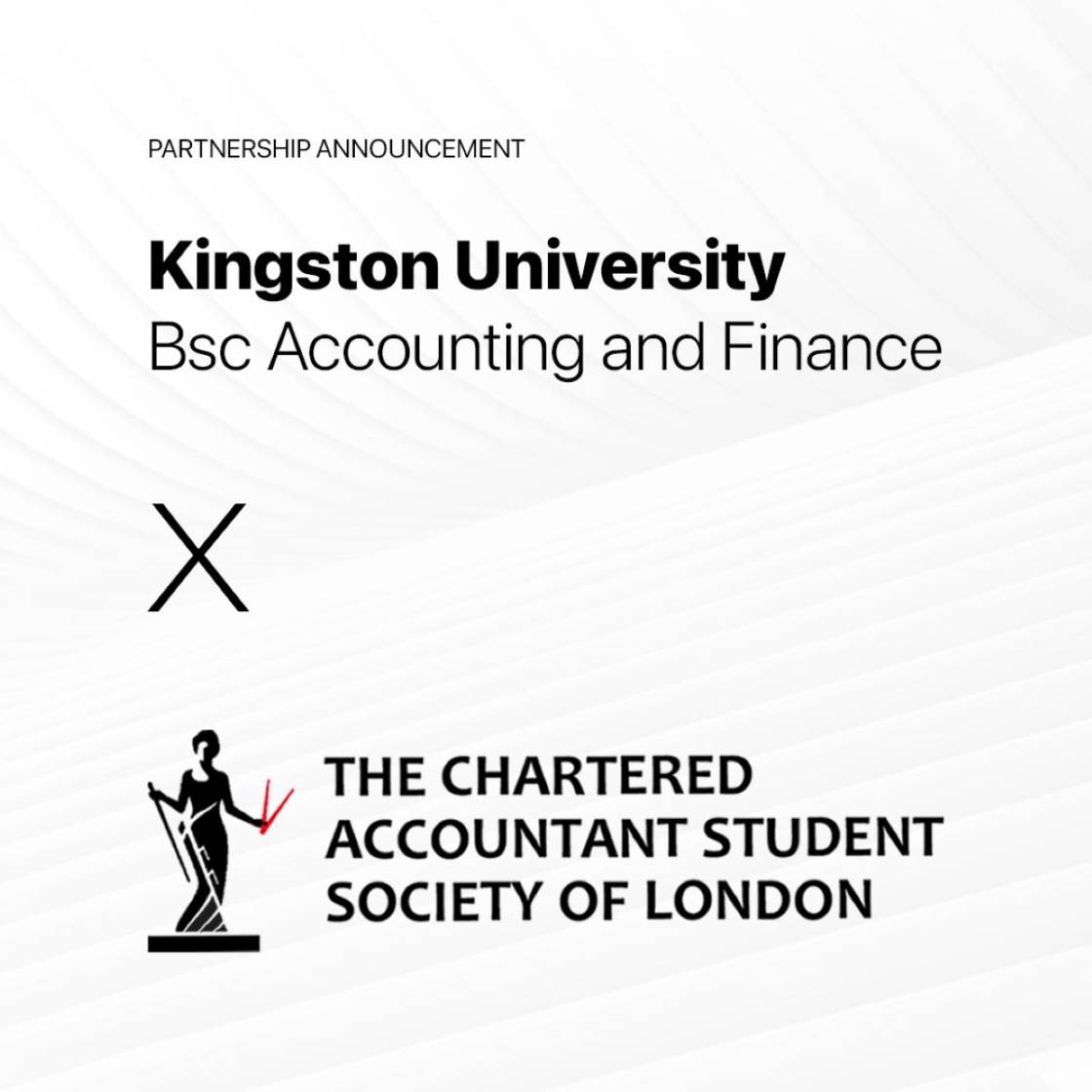
Entry requirements
If you would like to join us through Clearing 2024, please call our Clearing line on 0800 0483 334 (or +44 020 8328 1149 if you are calling from outside the UK) and speak to our friendly and knowledgeable hotliners who will be able to provide information on available courses and will guide you through your options.
Please note the entry requirements listed below are for 2025 entry only.
Teaching and assessment
Scheduled learning and teaching on this course includes timetabled activities including lectures, seminars and small group tutorials.
Who teaches this course?
You will be taught by an experienced teaching team whose expertise and knowledge are closely matched to the content of the modules on this course. The team includes senior academics and professional practitioners with industry experience. Student academic mentors also provide support during certain sessions, under the supervision of the module leader.
The following group of staff members are currently involved in the delivery of different elements of this course. This pool is subject to change at any time within the academic year.
Additional costs
Depending on the programme of study, there may be extra costs that are not covered by tuition fees which students will need to consider when planning their studies. Tuition fees cover the cost of your teaching, assessment and operating University facilities such as the library, access to shared IT equipment and other support services. Accommodation and living costs are not included in our fees.
Where a course has additional expenses, we make every effort to highlight them. These may include optional field trips, materials (e.g. art, design, engineering), security checks such as DBS, uniforms, specialist clothing or professional memberships.
Key information set
The scrolling banner(s) below display some key factual data about this course (including different course combinations or delivery modes of this course where relevant).
Course changes and regulations
The information on this page reflects the currently intended course structure and module details. To improve your student experience and the quality of your degree, we may review and change the material information of this course. Course changes explained.
Programme Specifications for the course are published ahead of each academic year.
Regulations governing this course can be found on our website.



